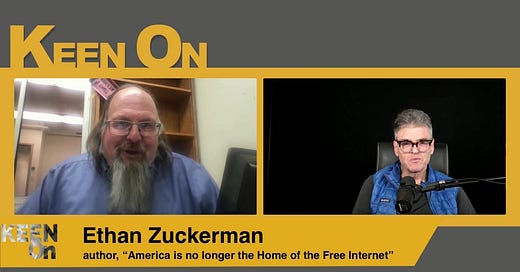Internet scholar and activist Ethan Zuckerman is horrified by the American ban on TikTok. As a self-described “progressive” with a long and distinguished career advocating for internet freedom, Zuckerman expresses alarm at how the U.S. has moved from defending unfettered access to information in the 1960s to now being willing to ban popular Chinese platforms like TikTok and perhaps even DeepSeek. He suggests the ban stems from the anti-China hysteria and exaggerated fears about social media's impact on young people fueled by paranoid critics like Jonathan Haidt. If this trend toward online censorship continues, Zuckerman warns, America will become indistinguishable from other authoritarian states in its disdain for digital freedom.
Here are the 5 KEEN ON takeaways from the interview with Zuckerman:
The TikTok ban represents a dramatic shift in American values - Zuckerman points out that the US has moved from defending unfettered access to information (even Communist propaganda) in 1965 to now being willing to ban popular platforms. He sees this as contradicting core First Amendment principles.
Anti-China sentiment and social media fears are driving policy - The push to ban TikTok stems from a combination of paranoia about Chinese influence and exaggerated concerns about social media's effects on youth. Zuckerman argues there's little evidence supporting claims of Chinese manipulation or widespread social media harm.
Young people view the TikTok ban as evidence of institutional disconnect - Students see the ban as proof that lawmakers don't understand modern technology or youth culture. Their response of moving to other Chinese platforms demonstrates their cynicism toward government actions.
Social media platforms have become too powerful to easily abandon - Despite disagreeing with the politics of platforms like Facebook and X, users remain because of network effects. Zuckerman himself confesses to still using these platforms to maintain connections, even while advocating for alternatives.
"Middleware" could offer a solution - Rather than banning platforms or creating new ones, Zuckerman (like Frank Fukuyama) advocates for tools that let users modify how they interact with existing platforms. However, he warns, major platforms like Meta actively resist these efforts through legal threats and technical barriers.
Ethan Zuckerman is an associate professor of public policy, communication, and information, as well as director of the UMass Initiative for Digital Public Infrastructure, focused on reimagining the Internet as a tool for civic engagement. His research focuses on civic media, online community governance, digital public infrastructure, quantitative studies of media attention, technology, and social change. Before coming to UMass, Zuckerman was at MIT, where he served as director of the Center for Civic Media and as associate professor of practice in media arts and sciences at the MIT Media Lab. His research focuses on the use of media as a tool for social change, the role of technology in international development, and the use of new media technologies by activists. The author of Rewire: Digital Cosmopolitans in the Age of Connection, he will publish a new book, Mistrust: Why Losing Faith in Institutions Provides the Tools to Transform Them (W.W. Norton), in early 2021. In 2005, Zuckerman cofounded Global Voices, which showcases news and opinions from citizen media in more than 150 nations and 30 languages. Through Global Voices, and as a researcher and fellow for eight years at the Berkman Klein Center for Internet and Society at Harvard University, Zuckerman has led efforts to promote freedom of expression and fight censorship in online spaces. In 1999, Zuckerman founded Geekcorps, an international, nonprofit, volunteer organization that sent IT specialists to work on projects in developing nations, with a focus on West Africa. Previously, he helped found Tripod.com, one of the web's first "personal publishing" sites. In addition to authoring numerous academic articles, Zuckerman is a frequent contributor to media outlets such as The Atlantic, Wired, and CNN. He received his bachelor's degree from Williams College and, as a Fulbright scholar, studied at the University of Ghana at Legon.
Named as one of the "100 most connected men" by GQ magazine, Andrew Keen is amongst the world's best known broadcasters and commentators. In addition to presenting the daily KEEN ON show, he is the host of the long-running How To Fix Democracy interview series. He is also the author of four prescient books about digital technology: CULT OF THE AMATEUR, DIGITAL VERTIGO, THE INTERNET IS NOT THE ANSWER and HOW TO FIX THE FUTURE. Andrew lives in San Francisco, is married to Cassandra Knight, Google's VP of Litigation & Discovery, and has two grown children.













Share this post